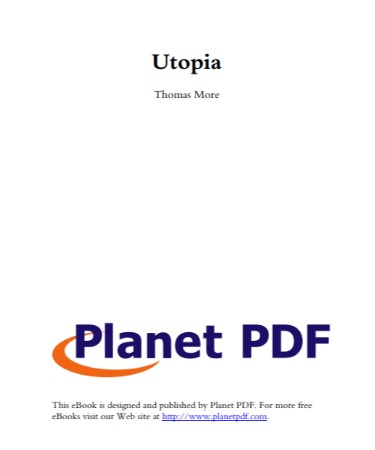
Thevet described the people, plants, and animals that he encountered in the region of present-day Brazil, where he traveled to help establish a French colony. The New Found Worlde was first published in Paris in 1557.

Why does the narrator consider Utopia the best, indeed the only, true commonwealth in the world?.In the passage that follows, the explorer contrasts Utopia with England.
Utopia thomas more lesson free#
Men and women receive the same education and are free to practice the religion of their choice. Everyone works, but only six hours a day. They have no private property or distinction of rank and no war. Utopians are ruled by an elected magistrate. On his return to Europe, he describes a society in which everyone lives for the common good, as determined through natural reason. In Utopia, More imagined a member of Amerigo Vespucci’s expedition to the New World who becomes separated from the other Europeans and discovers the island of Utopia. It was translated into English and printed in London 25 years later, after the death of Henry VIII. Thomas More wrote Utopia in Latin in 1516 and published it in Louvain, in present-day Belgium, in order to avoid political persecution in England. Are native people idealized or denigrated in these representations? Do they inhabit a world that is preferable to the Europeans’ world?.How do these writers use representations of Native American and utopian societies to critique their own European societies? What social problems do they perceive to be most urgent?.What qualities do these writers identify as the basis of an ideal society?.How does the exploration of the Americas contribute to the European imagination of an ideal society?.Please keep the following questions in mind as you review the documents: The documents that follow demonstrate some of the ways in which Renaissance writers and artists imagined the New World and its utopian possibilities. But his book participated in, and helped to initiate, a Renaissance literary tradition that brought together the exploration of the Americas, the critique of European societies, and the desire to create better communities in which to live. More could not publish Utopia in England under the reign of Henry VIII-his imaginary society was too clearly an indictment of Henry’s England.

It seemed to many Europeans that anything might be found in this New World, including human societies that were better organized than their own. More wrote Utopia just 24 years after Columbus’ arrival in the Caribbean, and his narrative suggests how European contact with the Americas provoked the imagination. More devised utopia from Greek terms meaning “not a place” or “nowhere,” but he also provided his Utopia with a specific geography: he locates his fictional island in the New World. The English humanist, Thomas More, introduced the word in 1516 to name a fictional island that was the site of an ideal commonwealth.

Although people had imagined ideal societies since at least the classical period, the term utopia first appeared less than one hundred years before Shakespeare wrote The Tempest. Gonzalo’s description of a society in which “All things in common nature should produce” suggests just one of the ways in which Shakespeare adapted contemporary ideas about utopian societies.

In The Tempest, the “honest old councilor,” Gonzalo, imagines an ideal commonwealth in which there would be no private property, no magistrate, no labor, and no inequality of rank.


 0 kommentar(er)
0 kommentar(er)
